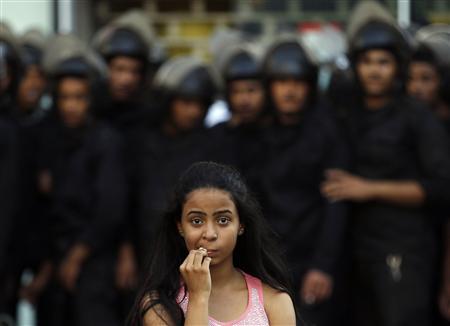Latest NEWS
- Aswat Masriya, the last word
- Roundup of Egypt's press headlines on March 15, 2017
- Roundup of Egypt's press headlines on March 14, 2017
- Former Egyptian President Hosni Mubarak to be released: lawyer
- Roundup of Egypt's press headlines on March 13, 2017
- Egypt's capital set to grow by half a million in 2017
- Egypt's wheat reserves to double with start of harvest -supply min
- Roundup of Egypt's press headlines on March 12, 2017
Rights group challenges protest law's constitutionality

By Rana Muhammad Taha
CAIRO, Sept 13 (Aswat Masriya) – An Egyptian rights group filed on Saturday a lawsuit at Egypt's top court, the Supreme Constitutional Court, challenging the constitutionality of the protest law.
Former interim President Adli Mansour issued the protest law on November 24 to regulate peaceful assembly. The law has long been the epicentre of wide criticism by domestic and international human rights organisations which say it violates international standards for peaceful protests.
Article 8 of the legislation obliges demonstrators to inform the authorities of their intention to assemble at least three working days prior to their scheduled events. Article 10 meanwhile gives the interior ministry the right to cancel, postpone or move protests "should they receive serious intelligence suggesting the organisers would breach … the law."
Lawsuit challenges the law's constitutionality
The Egyptian Centre for Economic and Social Rights (ECESR), a Cairo-based rights group directed by former presidential candidate Khaled Ali, had filed the lawsuit at Egypt's administrative court before it was referred to the Supreme Constitutional Court.
Mohamed Adel Seliman, among the ECESR lawyers working on the case, said the group received a permit from the administrative court to challenge the law's constitutionality. Egypt's laws prevent plaintiffs from directly approaching the Supreme Constitutional Court; lawsuits must be filed at other courts which in turn refer them to the constitutional court.
The plaintiffs argue that the law breaches Article 73 of the new constitution, passed in January. The article gives citizens the right to organise peaceful public assemblies, marches and protests after notifying the authorities with the plans for assembly. The manner of notifying the authority is to be organised by the laws, according to the article.
Seliman says this contradicts Articles 8 and 10 of the protest law, which necessitate the submission of a written notice for an assembly while granting the security authorities the right to cancel them.
"The law therefore changes the notice into a permit," Seliman told Aswat Masriya.
Hunger strike campaign
The law has lately been met with a stringent hunger strike campaign, gaining momentum by the day, with over 100 already on hunger strike inside and outside prisons.
The Freedom for the Brave, a movement calling for the release of those detained pending politically-motivated charges, announced on Sunday a gradual hunger strike campaign demanding the release of detainees held under protest law charges.
Hunger-striking detainees include Sanaa Seif, who is facing trial on Saturday alongside 21 others, her brother Alaa Abdel Fattah, who was sentenced to 15 years in prison alongside 24 others and is being retried, and prominent political activist Ahmed Douma, who was sentenced with April 6 Youth Movement co-founders Ahmed Maher and Mohamed Adel to three years in prison. All the aforementioned detainees have faced or remain facing charges related to breaching the protest law.
A group of political parties joined the hunger-strike campaign on Friday. Parties including al-Dostour party, the Egyptian Social Democratic party, the Egyptian Popular Current and the Socialist Popular Alliance Party demanded the amendment of the protest law.
The law was described by the protesting political parties as "breaching basic rights stipulated in the constitution and contradicting what the Egyptian people have achieved in the wake of the January 25 revolution."
A number of journalists announced on Saturday going on hunger strike for two days in protest over the protest law.
The law grants security forces the right to resort to the "gradual use of force" in facing unauthorised protests, beginning with the use of water cannons, batons and teargas and extended to involve the possible use of warning shots, rubber bullets and birdshot. Should the any of the protesters use firearms, security forces are allowed to respond in "proportionate" measures using their right to "legitimate self-defence", as per Article 13 of the law.
During a press conference held in Cairo on Saturday, United States Secretary of State John Kerry said he discussed with Egyptian officials, including President Abdel Fattah al-Sisi, the protest law and the U.S. "concern" regarding it. He stressed that the U.S. does not trade its concern for human rights with concern for any other issues.










